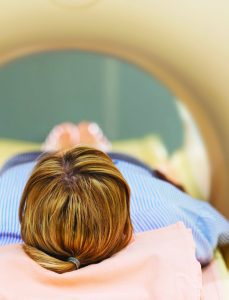 Magnetic resonance imaging, or MRI, uses a powerful magnetic field and radio waves to create images of your internal organs, tissues, and structures. An MRI is a useful tool that can help your Physician make a diagnosis and create a treatment plan for your condition. You do not have to do much to prepare for an MRI, however knowing what to expect can help you feel prepared for the test and help ease the anxiety of the procedure.
Magnetic resonance imaging, or MRI, uses a powerful magnetic field and radio waves to create images of your internal organs, tissues, and structures. An MRI is a useful tool that can help your Physician make a diagnosis and create a treatment plan for your condition. You do not have to do much to prepare for an MRI, however knowing what to expect can help you feel prepared for the test and help ease the anxiety of the procedure.
• An MRI is a large tube with holes on either end. You’ll be placed on a moveable table that slides into the tube while a technologist monitors you from another room.
• Although the exam uses magnetic fields and radio waves, the procedure is painless.
• The MRI machine makes a lot of noise while the procedure is taking place, however you may listen to music during the process.
• Exams do vary in length, but some can be quite long. It occasionally takes up to an hour for an exam to be completed.
Inside the MRI Machine
MRI’s electric field is emitted through a large coil. When the electrical current runs through the coil, loud noises are produced. The sounds are normal, but noise cancellation devices with music are provided for your comfort.
Although there is ample space, the tube itself is cylindrical and many individuals feel more peaceful if they keep their eyes closed while in the tube. You should speak with your doctor regarding any issues or concerns that you may have, especially if you are claustrophobic. Your doctor may want to give you a sedative for the test, and in that case, you would need to ask a friend or family member to join you or make sure that you have safe transportation to and from your appointment. It is also very important to talk to your doctor about any metal implants that you may have prior to the exam. Cochlear (ear) implants, clips used for brain aneurysms, metal coils placed within blood vessels, any kind of cardiac defibrillator or pacemaker generally means you cannot be
placed in an MRI machine. Some metallic implants pose a risk to health, safety, and accuracy of the exam. However, depending on how long the devices have been in place, it might be safe to undergo the exam with some of the following in place: artificial heart valves, artificial limbs or metallic joint prosthetics, metal pins, screws, plates, stents, and surgical staples.
Arriving to your appointment
Patients are given an arrival time for their appointment, which allows them to fill out the necessary paperwork and discuss the procedure beforehand. You will be asked to fill out an MRI screening form. This is a 3 to 5 page document that asks for basic information about your name, age, birth date, as well as questions about your medical history. Take time to read the form closely and answer all questions to the best of your ability. This form will also ask questions about allergies and any past reactions that you have had to contrast materials used in imaging procedures. Some MRI’s require an intravenous injection of a contrast material called gadolinium, which can cause an allergic reaction in rare circumstances. Please ask a staff member if you have any questions regarding the paperwork.
Before your exam, please remove any items that contain metal. This would include:
• All jewelry
• Eyeglasses
• Hairpins/Barrettes containing metal
• Dentures
• Watches
• Hearing Aids
• Wigs
• Underwire bras
Once you’ve filled out the paperwork, you’ll change into a gown and remove all items that contain metal. At this point, you’ll move into the MRI room. It is essential to follow all instructions given by the MRI technician. During the MRI, you will be able to hear and speak with the MRI technician. In some cases, you may be asked to perform some simple tasks, such as tapping your fingers or answering some easy questions. But in most cases, you will need to stay as still as possible during the procedure to ensure that the images will be clear. Just try to breathe normally and remain still.
MRI’s are used all over the world for precise accuracy in detecting structural abnormalities. The benefits of this type of imaging have proved safe and highly effective in diagnosing various disease states and irregularities. Early diagnosis is what saves lives; so if you are in need of an MRI, trust the experts of Naples Imaging to assist you through the process.
Partners Imaging of Naples
730 Goodlette Road North, Suite 101, Naples FL 34102
For more information, please visit naplesmedicalimaging.com, or call (239) 262-5151.









